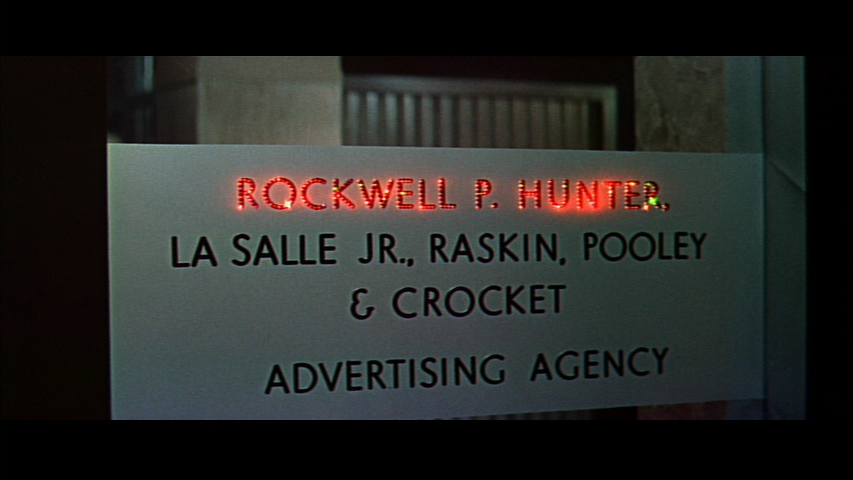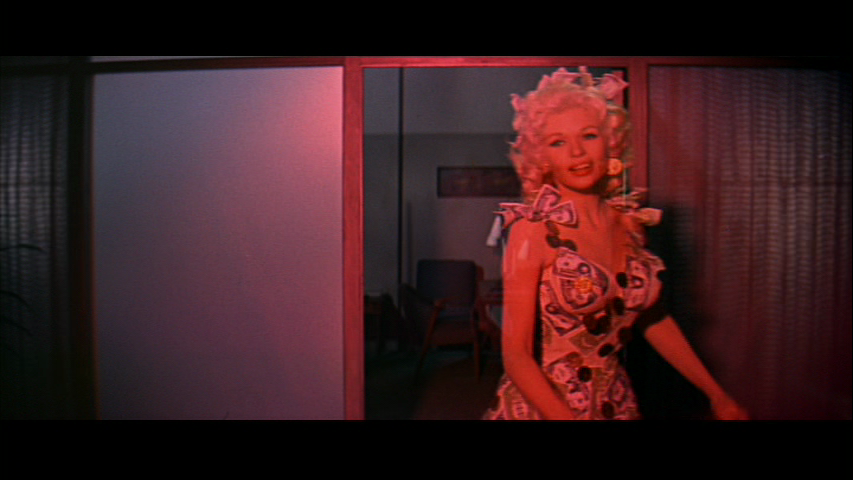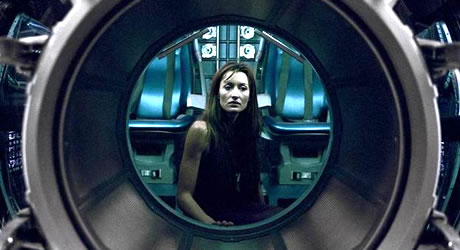Written for Frank Tashlin, edited by Roger Garcia (Éditions du Festival international du film de Locarno in collaboration with the British Film Institute [London]/Editions Yellow Now [Crisnée, Belgium], 1994). -– J.R.


Will Success Spoil Rock Hunter?
Clearly Tashlin’s most avant-garde feature, and probably his most political, thus his most misunderstood. Retaining the title, Jayne Mansfield, and advertising from George Axelrod’s Broadway play, but reportedly little else, Tashlin mounts a thoughtful and multifaceted polemic against the success ethic itself. (A key line: “Success will fit you like a shroud.”) The consequences are dazzling for his art but disastrous for his career. Made at Fox on the heels of The Girl Can’t Help It, the film provides a textbook illustration of George S. Kaufman’s maxim, “satire is what closes in New Haven.” Fortunately, before the balance sheets are counted, 50s America receives one of its two most devastating caricatures on film; the other is Chaplin’s A King in New York, made the same year. Paraphrasing Rossellini, both are the films of free men; fully anticipating Godard’s journalistic directive that you can – and must – place everything in a film, both filmmakers hit on nightmarishly topical New York dystopias set in the present, where, thanks to TV and advertising (rightly perceived as synonymous), the divisions between public and private are now fully obliterated. Read more
Written shortly after the Rotterdam Film Festival in February 2004 for Cinema Scope. It’s too bad that it hasn’t been possible for anyone (except for Ray Carney and his students, apparently) to see the first version of Shadows again since that festival, apart from the three short clips that Carney posted here. (The reasons for this have been discussed by Carney on his web site, but not, alas, by Gena Rowlands, Al Ruban, and/or the late Seymour Cassel in any comparable public forum, as far as I know. I should add that all the photographs here, apart from production stills, are from the second version.) — J.R.

In many respects, the most interesting movie I saw at the Rotterdam Film Festival last month was neither new nor a Golden Oldie, at least in any ordinary sense of either term, but a work that had been considered lost for almost half a century —- the original version of Shadows, John Cassavetes’ first feature, shot in the spring of 1957. Extensively reshot by Cassavetes two years later and re-edited into the film as we now know it, this shorter and rougher version was heralded by Jonas Mekas in 1960 as not only superior to the second, but a major aesthetic breakthrough, and we’ve had to wait 40-odd years to test the merits of his claim. Read more
From the Chicago Reader (November 29, 2002). Soberbergh’s Contagion confirms his bottomless cynicism, as well as the cynicism of those reviewers who seem to like him because he expresses their jaundiced views. I continue to find that same cynicism lethally dull and all too familiar. — J.R.
SOLARIS
* (Has redeeming facet)
Directed and written by Steven Soderbergh
With George Clooney, Natascha McElhone, Viola Davis, Jeremy Davies, and Ulrich Tukur.
It’s easy to scoff at Monarch Notes, but before I quit graduate school in disgust I reached for them every time I thought a professor might be ruining a literary masterpiece for me — and vowed to read the work later, on my own time, for my own reasons. As a teacher, I also used them when I suspected a student of plagiarism, and they did help me spot an offender or two. But having read the outlines, I rarely read the works — the crib had robbed me of the desire.
If you haven’t seen Andrei Tarkovsky’s 1972 SF masterpiece Solaris, can’t see it Friday night, November 29, on Turner Movie Classics, and don’t want to watch the just-released DVD or wait for the Music Box’s rerelease in January, you might find Steven Soderbergh’s remake intriguing and compelling, because the story it tells is certainly haunting. Read more




